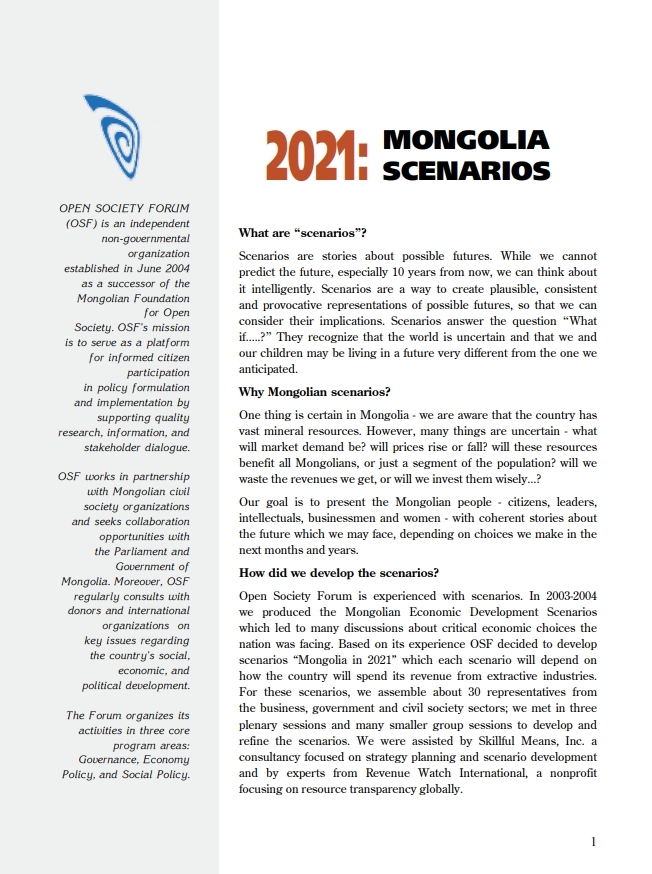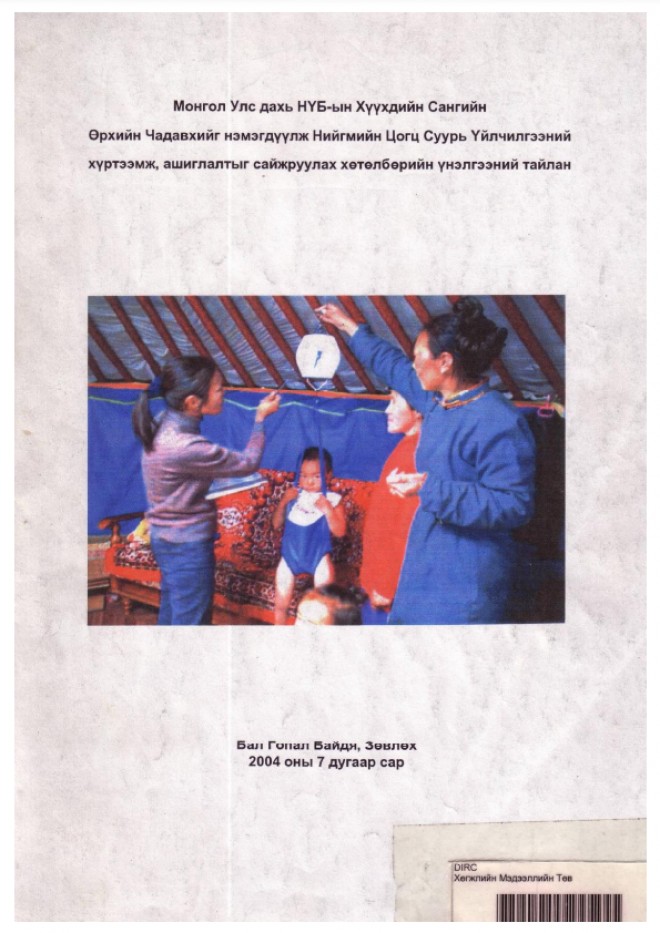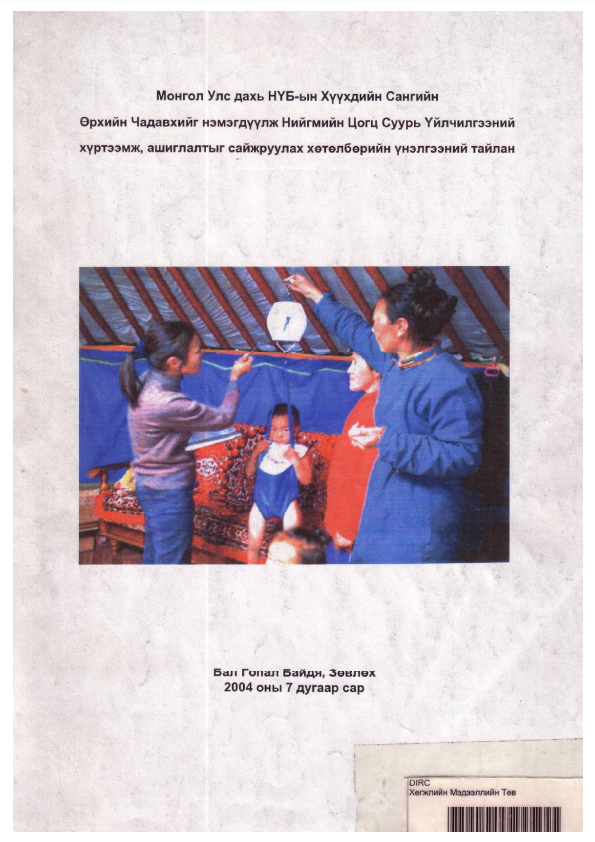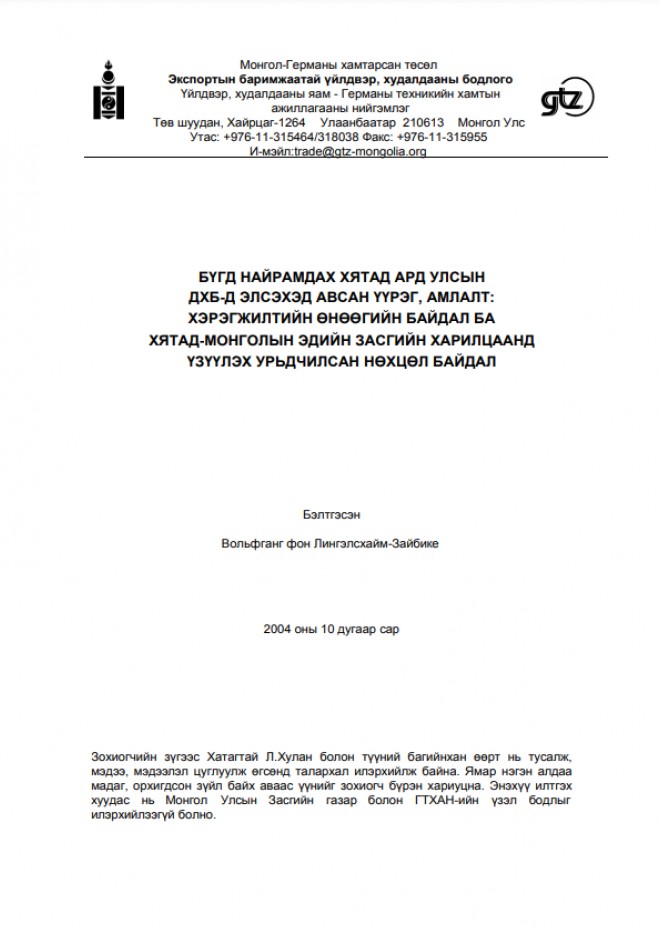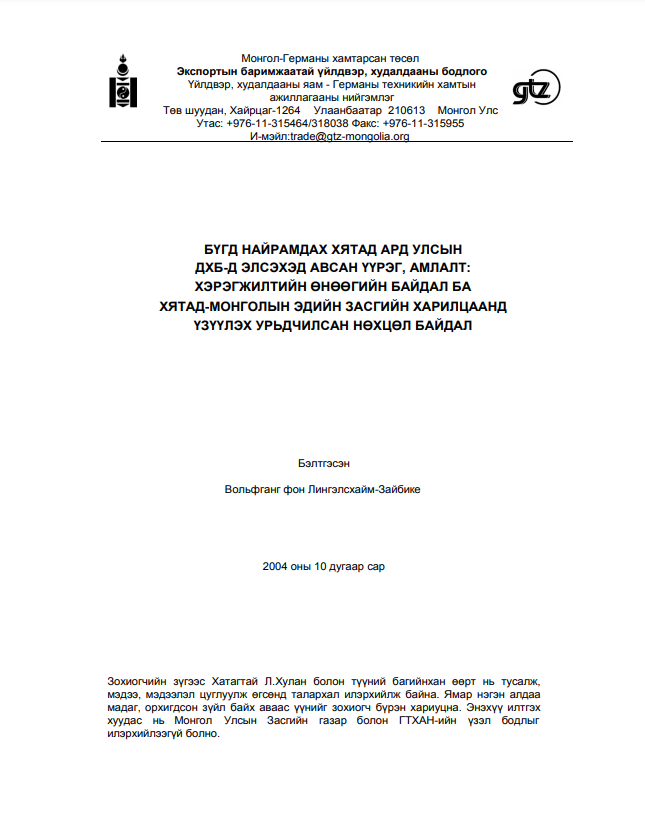Mongolia 2021: Scenarios
What are “scenarios”?
Scenarios are stories about possible futures. While we cannot predict the future, especially 10 years from now, we can think about it intelligently. Scenarios are a way to create plausible, consistent and provocative representations of possible futures, so that we can consider their implications. Scenarios answer the question “What if.....?” They recognize that the world is uncertain and that we and our children may be living in a future very different from the one we anticipated.
Why Mongolian scenarios?
One thing is certain in Mongolia - we are aware that the country has vast mineral resources. However, many things are uncertain - what will market demand be? will prices rise or fall? will these resources benefit all Mongolians, or just a segment of the population? will we waste the revenues we get, or will we invest them wisely...? Our goal is to present the Mongolian people - citizens, leaders, intellectuals, businessmen and women - with coherent stories about the future which we may face, depending on choices we make in the next months and years.
How did we develop the scenarios?
Open Society Forum is experienced with scenarios. In 2003-2004 we produced the Mongolian Economic Development Scenarios which led to many discussions about critical economic choices the nation was facing. Based on its experience OSF decided to develop scenarios “Mongolia in 2021” which each scenario will depend on how the country will spend its revenue from extractive industries. For these scenarios, we assemble about 30 representatives from the business, government and civil society sectors; we met in three plenary sessions and many smaller group sessions to develop and refine the scenarios. We were assisted by Skillful Means, Inc. a consultancy focused on strategy planning and scenario development and by experts from Revenue Watch International, a nonprofit focusing on resource transparency globally.
Scenarios are created from “driving forces”, critical factors which in some cases are relatively certain - population growth, for example - and in other cases are importantly uncertain -developments in neighboring countries, for example. We began by identifying the concerns of Mongolians about the management of our mineral resources and the management of the revenues which we expect. We then looked at various ways of distinguishing the scenarios from each other. We settled on an “axis” and three key questions which might lead to very different futures.
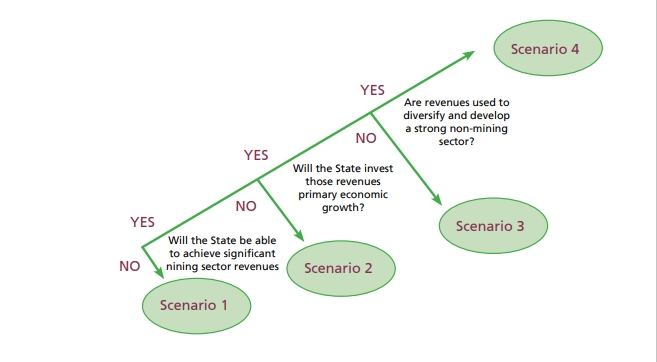
We also agreed on elements that would be addressed in each scenario - inflation, GDP, mining sector revenues, employment, exchange rates, etc. - and the characters—notably Zaya - in our scenario stories. Then we divided into four teams and started writing the scenarios. The scenarios are the story of Zaya and her friends and family, to show what might happen to ordinary Mongolians under each of the scenarios depending on how the country will spend its revenue from mining. In reading the scenarios, it is important to remember several things. Most importantly, the scenarios are not projections or predictions; we are not claiming that the future will in fact unfold precisely or even roughly along these lines. When reading the scenario, we ask that you consider only three questions: is the scenario plausible (might it happen, even if not exactly as the writers suggested)? Is the scenario coherent (does it reflect a sound internal logic)? Is the scenario provocative (does it make you think)?
Төрийн бус байгууллагуудын нийгмийн салбарт хэрэгжүүлсэн төсөл, хөтөлбөрийн судалгаа
Төрийн бус байгууллагуудын нийгмийн салбарт хэрэгжүүлсэн төсөл, хөтөлбөрийн судалгаа
Хэвлэн нийтэлсэн: НҮБ-ын Хөгжлийн хөтөлбөр
Он: 2000
Файлын төрөл: pdf
Файл: /uploads/site/1126/res_mat/NGO_final_report_mongolian.pdf
Түлхүүр үг: Монголын төрийн бус байгууллагын үйл ажиллагаа, иргэний нийгэм, Монголын ТББ-ын өнөөгийн байдал, ТББ-ын оролцоо, ТББ-ын чадавхи, ТББ-ын санхүүжилт
Survey report on NGO implemented assistance in social sector of Mongolia
Survey report on NGO implemented assistance in social sector of Mongolia
Хэвлэн нийтэлсэн: UNDP
Он: 2000
Файлын төрөл: pdf
Файл: /uploads/site/1126/res_mat/NGO_final_report_english.pdf
Түлхүүр үг: Mongolian Government's social policy, non-governmental organization, NGOs in Mongolian NGOs in 2000-2004, NGOs activities and Government policy
Хэвлэн нийтэлсэн: Нээлттэй Нийгэм Форум
Он: 2004
Файлын төрөл: pdf
Файл: /uploads/site/1126/res_mat/tailan 1.pdf
Түлхүүр үг: газрын шинэтгэл, газар ашиглалт, газар эзэмших өмчөх, газрын тухай хууль, Монгол улсын газрын харилцааны хууль эрх зүйн орчин, газар ашиглалтын мониторинг
Хэвлэн нийтэлсэн: Нээлттэй Нийгэм Форум
Он: 2004
Файлын төрөл: pdf
Файл: /uploads/site/1126/res_mat/tailan 2.pdf
Түлхүүр үг: газрын шинэтгэл, газар ашиглалт, газар эзэмших өмчөх, газрын тухай хууль, Монгол улсын газрын харилцааны хууль эрх зүйн орчин, газар ашиглалтын мониторинг
Дунд орлоготой хүмүүсийг эмзэг бүлгийн эгнээнд орохоос урьдчилан сэргийлэх арга замууд
Дунд орлоготой хүмүүсийг эмзэг бүлгийн эгнээнд орохоос урьдчилан сэргийлэх арга замууд
Хэвлэн нийтэлсэн: НҮБ-ын Хөгжлийн хөтөлбөр
Он: 2004
Файлын төрөл: pdf
Файл: /uploads/site/1126/res_mat/MiddleIncome_mong.pdf
Түлхүүр үг: өрхийн амьжиргаа, дунд орлоготой өрхийн амьжиргаа, өрхийн амьжиргааны түвшин, дунд орлоготой иргэд, дунд орлоготой өрхийн орлого зарлага, ядуурлыг буурулах арга зам
НҮБ-ын Хүүхдийн Сангийн Өрхийн Чадавхийг нэмэгдүүлж нийгмийн цогц суурь Үйлчилгээний хүртээмж, ашиглалтыг сайжруулах хөтөлбөрийн үнэлгээний тайлан
Нийгмийн хамгааллын салбарт зарцуулж буй улсын төсвийн хөрөнгийн жендэрийн дүн шинжилгээ
Нийгмийн хамгааллын салбарт зарцуулж буй улсын төсвийн хөрөнгийн жендэрийн дүн шинжилгээ
Хэвлэн нийтэлсэн: НҮБ-ын Хөгжлийн хөтөлбөр
Он: 2004
Файлын төрөл: pdf
Файл: /uploads/site/1126/res_mat/Social study_mong.pdf
Түлхүүр үг: нийгмийн хамгааллын зардал, төсвийн хуваарилалт ба жендерийн тэгш байдал, нийгмийн халамж, нийгмийн даатгал, Монгол улсын төсвийн хөрөнгийн зарцуулалт
Бүгд Найрамдах Хятад Ард Улсын ДХБ-д элсэхэд авсан үүрэг, амлалт: Хэрэгжилтийн Өнөөгийн Байдал ба Хятад-Монголын эдийн засгийн харилцаанд үзүүлэх урьдчилсан нөхцөл байдал
Хөдөлмөр эрхлэлт, нийгмийн хамгааллын салбар дахь хандивлагчдын зээл, тусламжийн зарцуулалтад хийсэн жендэрийн дүн шинжилгээ
Хэвлэн нийтэлсэн: НҮБ-ын Хөгжлийн хөтөлбөр
Он: 2004
Файлын төрөл: pdf
Файл: /uploads/site/1126/res_mat/Donor_budgetDistribution_2004_mong.pdf
Түлхүүр үг: хандивлагчдын зээл тусламж ба Монгол, амьжиргааны түвшин, ядуурлыг бууруулах хөтөлбөр, хөдөлмөр эрхлэлт, өрхийн орлого, нийгмийн хамгаалал ба нийгмийн халамж, Монголын эдийн засгийн амьдрал дахь жендерийн тэгш байдал, бичил санхүүгийн төсөл
Хэвлэн нийтэлсэн:
Он: 2004
Файлын төрөл: pdf
Файл: /uploads/site/1126/res_mat/corruption_Nov71.pdf
Түлхүүр үг: авилгалтай тэмцэх бодлого, улс төрийн бодлого, авилгал



